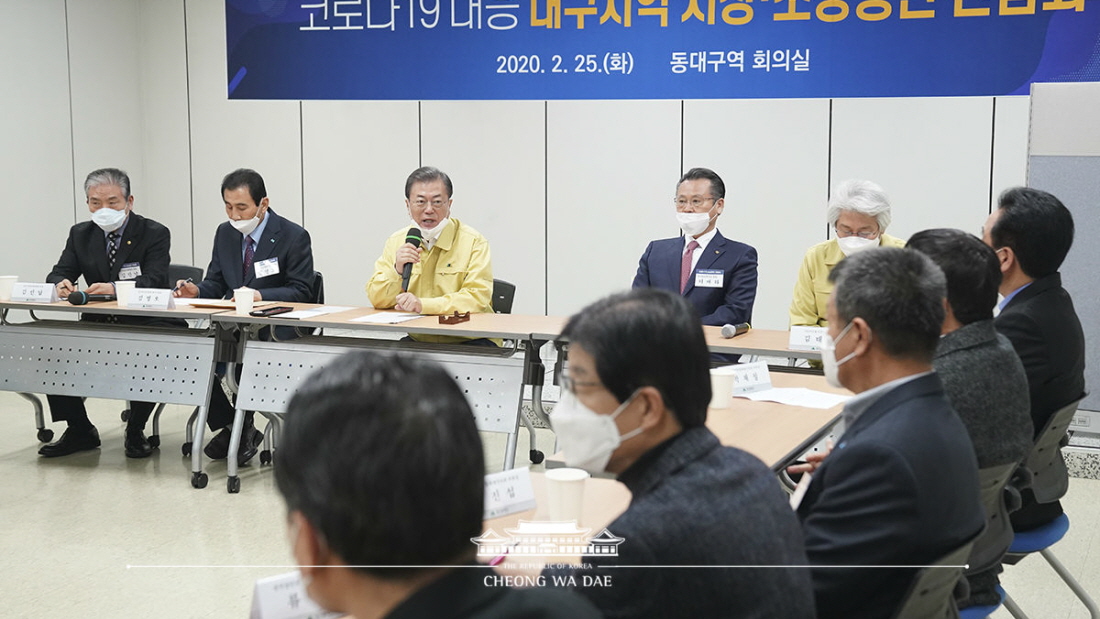이 웹사이트는 제19대 대통령 임기 종료에 따라 대통령기록관이 「대통령기록물 관리에 관한 법률」에 의해 이관받아 서비스하는 대통령기록물입니다. 자료의 열람만 가능하며 수정 · 추가 · 삭제는 불가능합니다.
다만, 「개인정보보호법」에 의하여 개인의 정보를 보호받기 원하시는 분은 관련 내용(요청자, 요청내용, 연락처, 글위치)을 대통령 웹기록물 담당자(044-211-2253)에게 요청해 주시면 신속히 검토하여 조치해 드리겠습니다. 감사합니다.
SPEECHES & REMARKS
BRIEFINGS
Remarks by President Moon Jae-in at Meeting with Microbusiness Owners and Market Merchants in Daegu over COVID-19 Countermeasures

Everyone must have immense concerns. I’ve come here today to experience firsthand what is making you anxious. COVID-19 is a novel infectious disease that we indeed knew nothing about. We have now come to understand its nature somewhat, but we are still unable to get the full picture of what it is. Moreover, as the situation that unfolded in China spun out of control, the Korean Government was of course on high alert and exerted all-out infectious disease prevention and control efforts from the beginning. At the same time, the Government was concerned about how these measures could negatively impact our economy, in particular local economies, as well as microbusiness owners, the self-employed, traditional markets and neighborhood commercial areas.
For this reason, as the Government carried out infectious disease prevention and control measures with the greatest sense of urgency from the start, I asked the public to join campaigns intended to revive the economy. We have taken actions to that end so far. Fortunately, the increasing number of confirmed cases seemed to level off at one point, and the economy showed signs of a slight rebound. However, this latest cluster of COVID-19 infections caused the number of confirmed cases to skyrocket, again making the economy worsen rapidly. In particular, the economy of Daegu came to bear the brunt of the outbreak entirely.
To cope with this challenge, the Government is devising various countermeasures and responding in a preemptive manner. Nonetheless, people on the ground likely have the sense that much is lacking. Today, I’d like you to clearly explain what that is. If you can tell us plainly what kind of assistance is needed and what has to be improved, it will help the Government formulate countermeasures.
In general, the Government will actively utilize special grants and reserve funds among other measures – though I expect that these things alone will fall far short of reviving the struggling local economy. Even if the region were declared a special disaster zone, that would still prove wholly insufficient. Therefore, I think we have to provide some active support through a supplementary budget. Fortunately, both the ruling and opposition parties in the National Assembly are giving positive feedback, so I believe it will work out well.
If I may add one more thing, the Government considers Daegu’s current hardships to be not just the city’s alone to bear but those of the entire Republic of Korea. I, too, have come to Daegu today in this respect. Starting from today, the Prime Minister also plans to be stationed here and take charge of the situation in the city. He was originally scheduled to come as soon as the Cabinet Meeting ended this morning. However, since I came down first, the Prime Minister will likely arrive and begin his posting here around the time when I am making my way back to Seoul. I believe that if the Prime Minister personally listens to what businesspeople in the region have to say about the difficulties facing the local economy, it will be more helpful for resolving challenges as they arise.
It’s my wish that today’s meeting provides more hope for Daegu’s citizens and economy – burdened as they are with huge hardships. I’d like to see us prevail together. I hope you stay strong while always keeping in mind that the Republic of Korea and all of the people are standing with Daegu’s citizens. Thank you.



